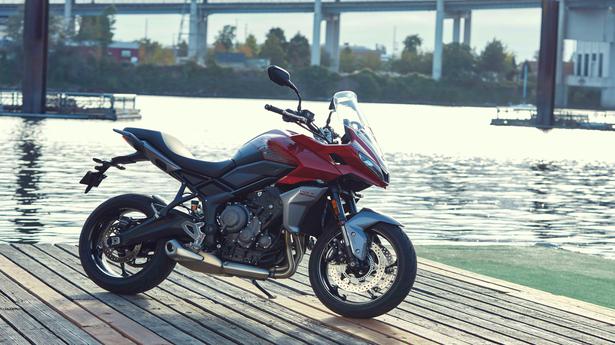
Triumph Tiger 660 to launch in India
The Hindu
The Triumph Tiger Sport 660, based on the Trident 660 street naked that went on sale in India last year, is slated to launch on March 29. However, it is different in many ways: the design, ergonomics and price point.
The Triumph Tiger Sport 660 has a rather sporty appearance, with a sharp-looking half fairing that encases the twin-LED headlights. The fuel tank is chunkier than the Trident’s, while the tail section looks pretty neat. The bike also gets a new TFT instrument cluster.
Coming to the ergonomics, the seat has been redone for better comfort, and the suspension travel has also gone up to 150mm on both ends. As a result, the seat height has risen by 30mm to 835mm, which is quite tall.
Coming to the bodywork, the Tiger Sport 660 utilises the same main frame as on the Triumph Trident 660, although the subframe is different, to accommodate the extra load that this touring-oriented bike is designed to carry. The swingarm is longer as well and the wheelbase has increased by 11mm.
The bike is powered by an 81hp, 64Nm, 660cc three-cylinder that is identical to the Trident, and is paired to a six-speed gearbox. An up/down quickshifter can be opted at extra cost.
The Tiger Sport 660 is expected to be priced between ₹ 9 lakh-9.5 lakh and goes up against the Kawasaki Versys 650. The British bike sure has its work cut out, considering the Japanese motorcycle is priced much lower at ₹ 7.15 lakh.

After a long, tiring day all we want is to jump right on our cosy beds and rest comfortably on our soft, fluffy pillows, right? Pillows are not quite appreciated as much as electric cars or air-fryers, for instance. Pillows are a wonderful man-made creation that has improved the lives and sleep of people across the globe. Did you know ages ago people used to rest their heads on a HARD ROCK? So how did humans go from sleeping on stones to cosy, fluffy and soft pillows today? Let’s get into the origin of your everyday pillows!

As the November 30 deadline nears for installing vehicle location tracking devices (VLTD) and emergency panic buttons in public service and nationally permitted goods vehicles in Karnataka, transport unions representing cab, bus, and truck operators are urging the government to reconsider the mandate. They argue that the high cost of these devices and a lack of awareness have made it difficult for many vehicle owners to comply with the requirement.









